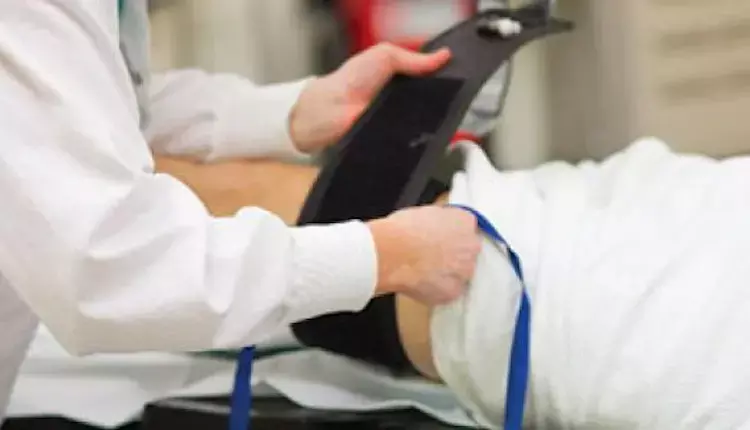- Home
- Medical news & Guidelines
- Anesthesiology
- Cardiology and CTVS
- Critical Care
- Dentistry
- Dermatology
- Diabetes and Endocrinology
- ENT
- Gastroenterology
- Medicine
- Nephrology
- Neurology
- Obstretics-Gynaecology
- Oncology
- Ophthalmology
- Orthopaedics
- Pediatrics-Neonatology
- Psychiatry
- Pulmonology
- Radiology
- Surgery
- Urology
- Laboratory Medicine
- Diet
- Nursing
- Paramedical
- Physiotherapy
- Health news
- Fact Check
- Bone Health Fact Check
- Brain Health Fact Check
- Cancer Related Fact Check
- Child Care Fact Check
- Dental and oral health fact check
- Diabetes and metabolic health fact check
- Diet and Nutrition Fact Check
- Eye and ENT Care Fact Check
- Fitness fact check
- Gut health fact check
- Heart health fact check
- Kidney health fact check
- Medical education fact check
- Men's health fact check
- Respiratory fact check
- Skin and hair care fact check
- Vaccine and Immunization fact check
- Women's health fact check
- AYUSH
- State News
- Andaman and Nicobar Islands
- Andhra Pradesh
- Arunachal Pradesh
- Assam
- Bihar
- Chandigarh
- Chattisgarh
- Dadra and Nagar Haveli
- Daman and Diu
- Delhi
- Goa
- Gujarat
- Haryana
- Himachal Pradesh
- Jammu & Kashmir
- Jharkhand
- Karnataka
- Kerala
- Ladakh
- Lakshadweep
- Madhya Pradesh
- Maharashtra
- Manipur
- Meghalaya
- Mizoram
- Nagaland
- Odisha
- Puducherry
- Punjab
- Rajasthan
- Sikkim
- Tamil Nadu
- Telangana
- Tripura
- Uttar Pradesh
- Uttrakhand
- West Bengal
- Medical Education
- Industry
Use of Bipolar Sealers and Tourniquet Have Similar Outcomes in TKA: Study

The use of tourniquets and bipolar sealers are effective methods of hemostasis during total knee arthroplasty (TKA). However, their effect on perioperative patient outcomes is unknown.
Stephen G. Zak et al conducted a study to compare the efficacy of tourniquet-less, tourniquet-less with use of a bipolar sealer, and tourniquet use on postoperative pain and surgical outcomes following TKA. The article has been published in Indian journal of orthopedics.
The authors found that both bipolar sealer and tourniquet use in TKA are associated with similar postoperative pain levels and length of stay (LOS) in comparison to tourniquet-less only TKA. However, bipolar sealer and tourniquet use may lead to better longer term improvement such as greater patient-reported outcome (PRO) score improvement and fewer readmissions.
A retrospective study of prospectively collected data of 120 primary TKA cases was conducted at an urban academic hospital. Primary outcomes were visual analog scale (VAS) scores and opioid consumption (in morphine milligram equivalents). Demographics, length of stay (LOS), perioperative complications, and change in Knee Injury and Osteoarthritis Outcome Score (ΔKOOS) were also collected. Patients were divided into cohorts based on the use of tourniquet-less with bipolar sealer (TRLB) (n=40), tourniquet (TR) (n=40), or tourniquet-less (TRL) (n=40).
The observations of the study were:
• There were no differences in demographic data between each cohort.
• TRLB, TR and TRL had similar LOS (2.68±1.63 vs 2.29±1.27 vs 2.36±1.42 days; p=0.472) and VAS pain score on postoperative day 1 (4.68 vs 3.74 vs 3.63; p=0.209).
• There were no differences in opioid consumption at 2 weeks (p=0.903), 1 month (p=0.973), 3 months (p=0.983), or 5 months (p=0.983) post-operatively.
• TRLB and TR had comparable improvement in ΔKOOS from baseline to 12 weeks post-operatively (Δ16.58±8.47 vs Δ23.92±14.60; p=0.254). Compared to the ΔKOOS of TRL (Δ5.19±2.59), TRLB and TR had clinically and statistically greater ΔKOOS improvements (p=0.009; p=0.001).
• The TRL cohort also had a higher readmission rate than TRLB and TR (15% vs 0% vs 5%, p=0.025).
The authors commented "In addition to maintaining hemostasis, blood loss reduction devices seem to provide intraoperative and perioperative benefits that may greatly assist surgeons in improving outcomes and recovery."
Further reading:
Bipolar Sealers and Tourniquet Use Have Similar Outcomes in Total Knee Arthroplasty
Stephen G. Zak, Nishanth Muthusamy et al
Indian Journal of Orthopaedics (2022) 56:1745–1750
https://doi.org/10.1007/s43465-022-00670-z
MBBS, Dip. Ortho, DNB ortho, MNAMS
Dr Supreeth D R (MBBS, Dip. Ortho, DNB ortho, MNAMS) is a practicing orthopedician with interest in medical research and publishing articles. He completed MBBS from mysore medical college, dip ortho from Trivandrum medical college and sec. DNB from Manipal Hospital, Bengaluru. He has expirence of 7years in the field of orthopedics. He has presented scientific papers & posters in various state, national and international conferences. His interest in writing articles lead the way to join medical dialogues. He can be contacted at editorial@medicaldialogues.in.
Dr Kamal Kant Kohli-MBBS, DTCD- a chest specialist with more than 30 years of practice and a flair for writing clinical articles, Dr Kamal Kant Kohli joined Medical Dialogues as a Chief Editor of Medical News. Besides writing articles, as an editor, he proofreads and verifies all the medical content published on Medical Dialogues including those coming from journals, studies,medical conferences,guidelines etc. Email: drkohli@medicaldialogues.in. Contact no. 011-43720751


